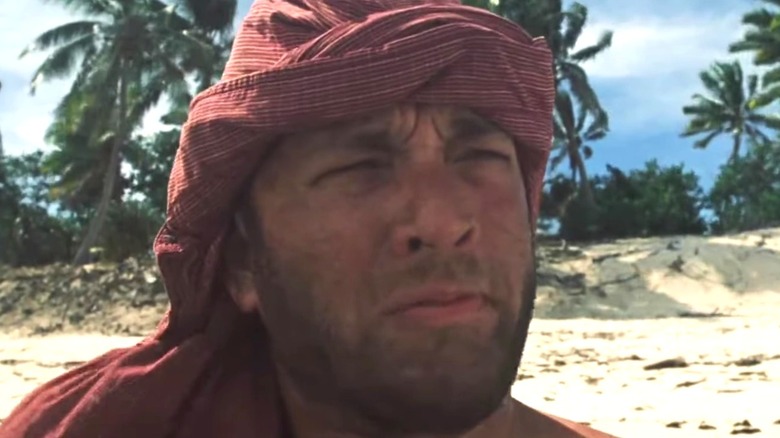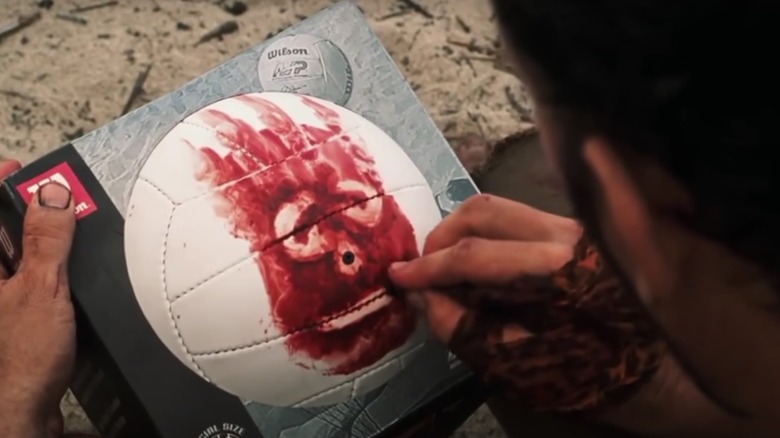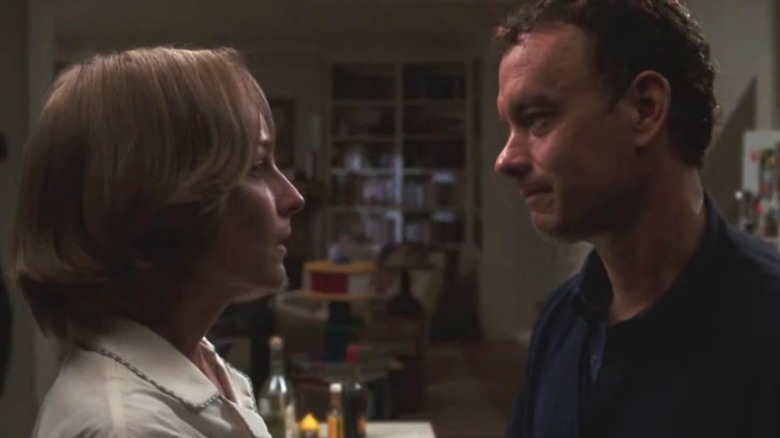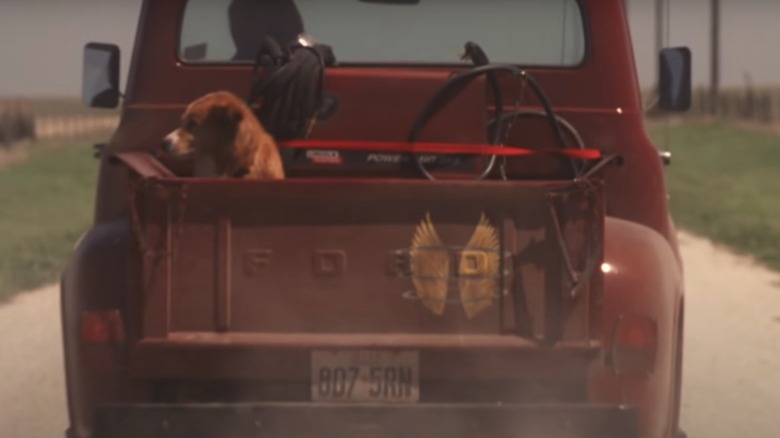The Ending Of Cast Away Explained
What do you get when you put Tom Hanks, Robert Zemeckis, and a blood-stained volleyball on a remote island for two and a half hours? The 2000 survival drama "Cast Away," which tells the story of a FedEx executive who finds himself stranded on a desert island for four years after a plane crash, was one of the most talked-about and lampooned movies of the time (how many times have you heard someone crying out "Wilson!"?). Many seem to have forgotten just what a fantastic film it is, even over 20 years later. With its harrowing theme of human survival, restrained direction, brutal moments, and Oscar-nominated performance by Tom Hanks, it remains one of both Hanks' and Zemeckis' finest works.
While the film is a seemingly simple journey, for the most part, the final act sneaks up on audiences in a way that is sure to give them a lot to think about. With a story that carries as much weight as this, there are more than enough thematic elements to chew on by the end of the gut-wrenching experience. So it's time we look back at the most critical elements of "Cast Away" and see how they define its conclusion. Spoiler alert, obviously (but the trailer already did that job for us).
Let's talk about Wilson
One of the most, if not the most, iconic parts of "Cast Away" is Chuck's relationship with Wilson, the volleyball named after Wilson Sporting Goods, the company the ball originates from. Wilson, which is stained with Chuck's bloody handprint and given a smiley face, provides Chuck with his only source of companionship during his time on the island.
Chuck's relationship with the ball evolves into full-blown bursts of emotional back-and-forth with the inanimate object. It sounds silly in concept (especially if all you've seen are parodies of the movie), but thanks to Tom Hanks' dedicated performance, we're taken on as much of an emotional roller coaster as he is.
This is most evident in how their relationship concludes. Chuck manages to build a durable raft, using the plastic from a portable toilet that washes up to the island as a sail. He successfully escapes and gets out into the open ocean, but after a harsh storm, Wilson falls off the boat and floats away, leaving Chuck emotionally shattered.
Chuck's journey sees him start off as an obsessive workaholic overly concerned with time and become a humbled individual, stripped of the feeling of control he had over his life. With this in mind, Wilson can be seen as the last shred of Chuck's hubris, an entity of his own creation with a literal part of him plastered onto it, floating away. His desperation to hold on to Wilson is not only for friendship but also for stability and a sliver of what he considers normal. Wilson's loss is therefore a necessary component if Chuck is to complete his metamorphosis.
The long lost love that will never be found
Possibly the most tragic part of the film comes toward the end, when Chuck discovers that his girlfriend, Kelly, played by Helen Hunt, has moved on and is married to another man. She has even had a child in that span of time. When the two meet up, despite the fact that both still have passionate feelings for one another, they know that their time has passed and they'll never be.
They trade the personal items of each other's that they had kept for the entire four years; Kelly gives Chuck back his car that she's kept in the garage and Chuck gives Kelly back the watch with her photo in it, returning the remaining literal and metaphorical pieces of one another they each held on to.
Chuck later opens up to his friend about the thoughts in his head following his ordeal. After a failed suicide attempt, he believed he would never leave the island and accepted his fate but also realized that he needed to keep pushing forward and fight for survival. Despite the pain of never being with Kelly again, the transformation he went through on the island has opened his mind to the endless possibilities the world has in store for him.
Crossroads and angel wings
While on the island, Chuck collects a number of FedEx packages that he finds washed up onshore, all but one of which he opens in an effort to survive. He leaves a box with golden angel wings because he believes it to be a sign from God that, one day, he will fly away from his situation. Throughout his time on the island, he never opens the package, even taking it with him when he escapes on the raft.
Back in the U.S., he personally returns the package to the address it was sent from. However, nobody answers the door, so he leaves the package on the porch along with a signed note reading, "This package saved my life. Thank you." After making the delivery, Chuck comes across a crossroads and is trying to figure out which way to go when an especially friendly woman stops to give him directions. As she drives away, Chuck sees that the back of her pickup truck has the same golden wings as were on the package. As the film comes to a close, Chuck is left in the middle of the empty crossroads, looking in the direction she went.
The very end of the film doesn't give its audience any meaty answers on where Chuck will end up. Will he follow the woman and try to start a relationship with her? Will he go down a different path and find happiness there? We, like Chuck himself, are left to wonder where that ever-evolving journey of change and acceptance of fate will go next.



